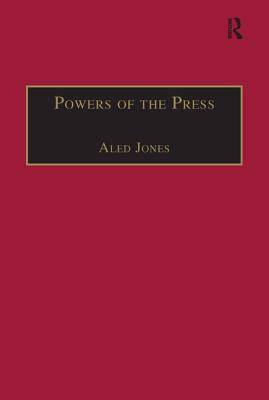
- Afhalen na 1 uur in een winkel met voorraad
- Gratis thuislevering in België vanaf € 30
- Ruim aanbod met 7 miljoen producten
- Afhalen na 1 uur in een winkel met voorraad
- Gratis thuislevering in België vanaf € 30
- Ruim aanbod met 7 miljoen producten
Zoeken
€ 71,95
+ 143 punten
Uitvoering
Omschrijving
The power of the popular press presents all modern societies with difficulties. It is, however, a problem with a history: the hold of the press over public opinion was debated with urgency throughout the 19th century. This book looks at the ways in which individuals, pressure groups, political organisations and the state sought to understand the mass communications media of the 19th century, and use them to influence public opinion and effect moral and social reform. Aled Jones addresses the problem by using three approaches: first he considers the 19th century theories of the influence of communications media on patterns of social thought and behaviour; then he examines attitudes towards the press in both high and popular culture; finally he explores the social and intellectual world of the reader, the consumer both of the press as a commodity and of the hidden moral strategies that were built into it. The tensions between Victorian moral imperatives and the operation of the free commercial market raised issues of great public concern, such as whether the mass media should be under private or public control. These tensions have dominated the way in which Britain and other western societies have thought about the newer broadcasting media, but their origins are older and more complex than studies of contemporary media acknowledge.
Specificaties
Betrokkenen
- Auteur(s):
- Uitgeverij:
Inhoud
- Aantal bladzijden:
- 248
- Taal:
- Engels
- Reeks:
Eigenschappen
- Productcode (EAN):
- 9781138276796
- Verschijningsdatum:
- 28/11/2016
- Uitvoering:
- Paperback
- Formaat:
- Trade paperback (VS)
- Afmetingen:
- 156 mm x 233 mm
- Gewicht:
- 452 g

Alleen bij Standaard Boekhandel
+ 143 punten op je klantenkaart van Standaard Boekhandel
Beoordelingen
We publiceren alleen reviews die voldoen aan de voorwaarden voor reviews. Bekijk onze voorwaarden voor reviews.











